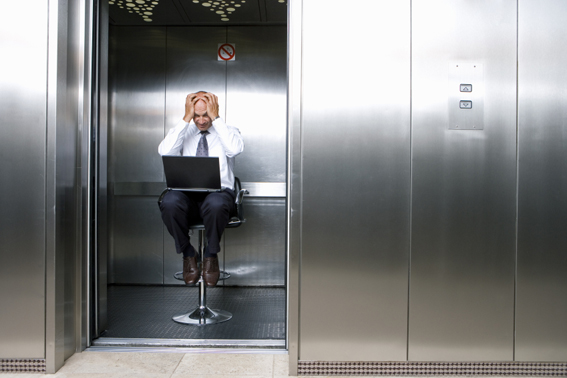The ups and downs of passenger lift safety

Recently, the BBC reported the shocking news that a woman fell into an open lift shaft at a Birmingham Coffee Shop.
It will be some time before the events leading up to the accident in Birmingham are known, but reports indicate that the doors, on an upper level, were able to opened without the lift car being in position.
While there should be numerous safety features built into modern lifts that should prevent this type of accident, this shows how important it is for businesses to ensure that they properly manage the safety of passenger lifts…
Are employers inspecting their lifts properly?
On a number of recent client inspections we have found that ‘Duty Holders’ are failing to thoroughly examine their lifts in accordance to Health & Safety regulations.
In most cases, the duty holder had service reports and maintenance records but were unable to produce a ‘Report of Thorough Examination’.
Failure to produce this report can result in the HSE serving improvement notices on both the Duty Holder and the company undertaking the examinations.
- A report of Thorough Examination must be completed by a competent person
- It must contain the information required by Schedule 1 of the Lifting Operation Lifting Equipment Regulations.
- Reports MUST be held on the premises where the equipment operates.
Operating a lift without a proper ‘Report of Thorough Examination’ can result in legal action such as a Prohibition Notice, preventing the use of the lift, or even prosecution.
The recently published Sentencing Guidelines now encourages courts to award fines based on potential injury rather than the actual outcome.
Given the fact that lift accidents can be serious, even fatal, fines for not having a proper ‘Report of Thorough Examination’ are likely to be at the upper end of the scale and could run into Hundreds of Thousands.
What does the law say?
Employers need to ensure their lifts:
- Are properly maintained and in a safe condition.
- Have a Thorough Examination at specified periods (12 months for a goods lift and 6 months for a passenger lift)
If the lift operates in none ideal conditions, the frequency of inspections can be altered slightly.
A lift examination can be compared to an MOT on a car – it is an independent check on the safety critical components of the lift machinery. Thorough Examinations are also required following substantial changes or damage to the lift.
The inspections must take place within the framework of these Health & Safety regulations:
- The Lifting Operations and Lifting Equipment Regulations 1998 (LOLER) and the associated Approved Code of Practice L113
- Provision and Use of Work Equipment Regulations 1998 (PUWER).
These must be followed, even where the regulations are not directly applicable: Passenger lifts which operate outside of a workplace may fall outside of these regulations but the operator will still have a duty to protect members of the public.
What should I do?
- If a serious or significant defect is found, ensure it is reported immediately to the Duty Holder. The lift MUST then be taken out of use until repaired.
- The competent person MUST also report this to the relevant enforcement agency (HSE or Local Authority) who are likely to contact the Duty Holder to confirm that works have been completed to make the lift safe again.
- Slightly less serious defects which require repairs, need to be listed on the Report of Thorough Examination with a time frame for repair. These are often referred to as TIME SPECIFIED defects. The Duty Holder MUST ensure that the necessary repairs are made before the date specified in the report.
- Duty Holders should ensure that they have both a maintenance contract and a programme of thorough examination in place.
- Ensure that the person completing the Thorough Examination is competent and provides a properly formatted report contained all the information required by LOLER.
If you need further help or advice you can book a consultation or 0844 391 1921


